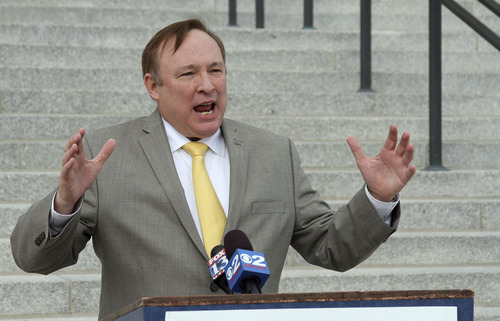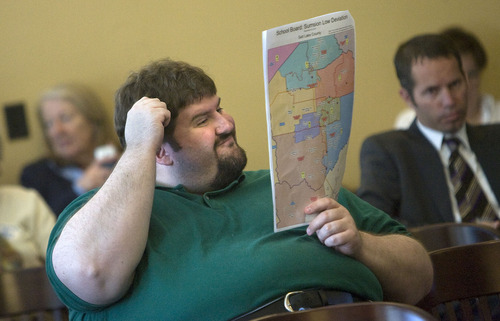This is an archived article that was published on sltrib.com in 2013, and information in the article may be outdated. It is provided only for personal research purposes and may not be reprinted.
After an 18-month standoff with the Utah Legislature over the cost and public release of redistricting documents, the Democratic Party prevailed in state court Tuesday, hailing the ruling as a victory for Utahns and their right to scrutinize the government.
Third District Judge L.A. Dever rejected the Legislature's argument that the court has no jurisdiction to review the redistricting-records request — and Dever ruled the state must pay the Democrats' attorneys fees, estimated at $15,000.
The decision fortifies the contention by Democrats and Utah media outlets also party to the lawsuit that the 16,000 pages of redistricting documents — posted online in November after a yearlong fight — should be accessible without exorbitant fees as a matter of public interest.
"His decision spoke loudly," said Democratic Party Chairman Jim Dabakis, a state senator, adding the Legislature cannot dismiss people from the Government Records Access and Management Act (GRAMA) process by charging them prohibitive fees.
"If they were playing the kind of tricks they were playing on us, it would put a dagger through the heart of GRAMA," Dabakis said. "The Democratic Party thought it was a priority to put an end to the shenanigans and that's what happened today."
Democrats paid $5,000 in January 2012 for one batch of redistricting records but were told the total cost for assembling all the documents — including 500 hours of staff time and copying charges — was $14,250. That's when the Democrats sued.
"The records have always been acknowledged as public records — the question was whether the fee should be paid for," explained legislative attorney Robert Rees. He said he does not yet know if the Legislature will appeal.
The $5,000 the party paid will not be refunded.
Democratic Party attorney Joe Hatch, a former Salt Lake County councilman, called the ruling a big victory for public disclosure but says he is concerned state lawmakers will now rewrite rules to deny judicial review of individual GRAMA requests.
Upon release of the redistricting records, then-Senate President Michael Waddoups, R-Taylorsville, said the move should release any suspicion that Republicans had something to hide. Democrats, whom he described as "verging on irrelevance," were overreaching, he said.
Democrats maintain the newly drawn congressional districts are between 62 and 72 percent Republican, while GOP leaders lower that estimate slightly to between 59 and 72 percent.
Dabakis, who says the public has a right to know about the gerrymandering "disaster," said Tuesday "It will be a generation before we rectify the tremendous injustice that has been done."
According to a Nov. 28, 2012, letter sent from Hatch to Rees, the Democratic Party offered to drop its lawsuit in exchange for $4,200 in attorneys fees accrued at that point. The state refused.
"It's going to cost the taxpayers a whole lot more money as a result of this," Hatch said. "It could have been resolved cheaply, but it was the Legislature that refused to resolve it cheaply."







